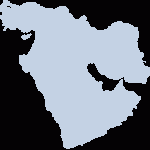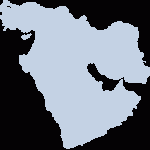 Sharmine Narwani writes in The Huffington Post:
Sharmine Narwani writes in The Huffington Post:Another war is looming in the Middle East, say the pundits. It is hard to ignore the whispers -- now louder -- when they are regularly punctuated by hostile statements from various officials in the region, leading further credence to a possible conflagration.
The likely site of the newest regional battle is the Levant. Funnily enough, nobody can pinpoint exactly where, although it is clear that Israel will be involved. Which should tell us something right there.
Middle East Inside Line: Hamas in Russia, Iran FM on “Crazy Israel”, Palestine Talks
Israel, Hamas, and Russia: Who is in Bed with the Bear?
Since the Jewish state's military attack on Lebanon in 2006, it has been itching for a "do-over." Why? Because for the first time in its history, Israel did not win a war. The month-long bombardment of Lebanon resulted in a stalemate -- an intolerable outcome by the standards of the Israel Defense Forces (IDF).
To add to the indignity, it was a mere few thousand men -- not even a national army -- that took the IDF by surprise.
The cornerstone of Israel's military strategy is deterrence -- whether though brandishing a nuclear arsenal to warn off threatening nation-states, or by Gaza-style intensive attacks that send a strong message to a weaker party. This is a highly militarized state that has lived under the legacy of conflict its entire existence. Loss -- or even perceived loss -- is not an option.
So instead of self-examination, Israel's conflicted, and increasingly right-wing political body unleashed a belligerent tone -- angry, defiant, threatening, unfocused like a petulant and wounded child. Diversionary tactics came into play to focus domestic and international attention elsewhere and fill the frustrating void -- Hamas in Gaza, the potential nuclear aspirations of Iran, Palestinian intransigence on peace talks, Hezbollah's weapons, Syria, Turkey, anti-Semitism, the Goldstone Report.
In recent weeks, Israeli officials have made inflammatory statements about conflicts on half a dozen fronts.
SYRIA:"When there is another war, you will not just lose it, but you and your family will lose power," right-wing Israeli Foreign Minister Avigdor Lieberman challenged Syrian President Bashar al-Assad last Thursday, after Assad claimed that Israel is "driving the region towards war, not peace."
Lieberman went further and hit at the heart of any future Israeli-Syrian rapprochement: "We must bring Syria to realize that...it will have to give up on its ultimate demand for the Golan Heights." Israeli leaders have in the past accepted in principle that the Syrian Golan Heights, captured and occupied by Israel in 1967, would necessarily be part of any bilateral peace deal.
GAZA:In January -- one year after Israel's Operation Cast Lead in Gaza that lead to the deaths of 1,400 Palestinians -- Major General Yom Tov Samia, former head of the IDF's Southern Command, told the
Jerusalem Post: "We are before another round in Gaza... another war with Hamas is inevitable." And Israeli Defense Minister Ehud Barak warned Gaza's leaders to "watch their step, and not to cry crocodile tears if they force [us] to take action."
The hue and cry about Hamas' rockets hitting Israeli towns was Tel Aviv and Washington's driving narrative in defense of Israel's military actions in Gaza. Still is. But just this week, the Jewish State announced that a new $200 million rocket defense system called the
"Iron Dome" will not be deployed against Gaza as promised. Too expensive for Gaza, says the military, explaining that it will be deployed elsewhere where there is more of an "imminent" threat.
And this comes after months of Israeli insistence that Hamas has significantly boosted its military capabilities and has obtained long-range rockets, mostly from Iran. So which is it -- either they do or don't have weapons, either they do or don't pose a threat?
LEBANON:No two other parties have been more relentlessly subjected to Israeli threats than Iran and Hezbollah. Last summer, after it was clear that the Lebanese resistance group Hezbollah would likely participate at the cabinet level in any unity government formed following Lebanon's June elections, Israeli leaders fell over themselves in their rush to issue warnings. Netanyahu, Barak and Deputy Foreign Minister Danny Ayalon all threatened that any border attacks would be blamed on the Lebanese central government -- with repercussions.
Just last month, Israeli Minister Yossi Peled opined, "Without a doubt we are heading for another round (of battle) in the North. No one knows when, but it's clear that it will happen."
And so both Hezbollah and Israel have moved weapons systems closer to their mutual borders.
IRAN:Iran, in turn, has been the recipient of non-stop bombing threats from Israel over its civilian nuclear program, which the Jewish State claims is really a clandestine plan to build nuclear weapons and delivery systems. Never mind that some two dozen International Atomic Energy Agency reports over six years show no diversion of materials to weaponization. Or that Israeli military intelligence has been extending the date for a finished Iranian nuclear warhead since the 1990s. Last June,
Mossad Chief Meir Dagan declared the new date for the first Iranian nuke would be in 2014. But Israel's war drums have kept beating as though these weapons were already sitting on launch pads, ready to go.
TURKEY:Relatively new on the scene in the game of belligerent words is Turkey. A rare Israeli ally in the Middle East both in political and military terms, Turkey has drawn away from the alliance since Israel's widely-criticized Gaza attacks last year, when Turkish Prime Minister Recep Tayyip Erdogan lashed out at the particularly brutal IDF campaign.
Things have gone from bad to worse since, culminating a month ago in the now-infamous Ayalon row when the Israeli deputy foreign minister publicly and deliberately humiliated Turkey's ambassador in front of cameras. Israel has called Turkey anti-Semitic and very recently slammed the Turkish prime minister again when he drew attention to the continuing Israeli blockade of Gaza and its daily violations of Lebanese airspace.
**********
Some Israeli critics suggest that the destabilizing escalation in rhetoric may not just be as a result of Israel's psychological loss in 2006, but more recently, because of an increased paranoia about international isolation -- the result of war crimes allegations documented against Israel in the UN's Goldstone Report about the Gaza war, and the country's ongoing occupation of Palestinian lands.
In a stunning attack on his government two weeks ago, Israeli writer
Gideon Levy wrote a commentary piece in
Haaretz in which he takes to task their "cynical" use of Holocaust Remembrance Day to propagandize toward political ends:
"An Israeli public relations drive like this hasn't been seen for ages. The timing of the unusual effort - never have so many ministers deployed across the globe - is not coincidental: When the world is talking Goldstone, we talk Holocaust, as if out to blur the impression. When the world talks occupation, we'll talk Iran as if we wanted them to forget."
But the escalation of rhetoric from Israel's right-wing government is not being viewed as simple political posturing -- more, like a promise of battle. As concerned as the Jewish State may be about conflict on its borders, its neighbors -- having been on the receiving end of superior Israeli weapons, and having suffered far larger numbers of civilian casualties -- are taking these words very seriously.
Syrian Foreign Minister Walid Muallem, at a joint press conference with Spain's Foreign Minister Miguel Angel Moratinos on Thursday pointed to this verbal escalation of hostilities by calling on Israel to "desist from making threats against Gaza, southern Lebanon, Iran and now Syria."
Because rhetoric after all creates a perception. And perception is 100% of politics -- not to be played with when standing on a tinderbox. The Levant has always been rife with small-scale border skirmishes -- that is the way of an area re-mapped by foreigners, with unnatural, artificial borders. But it is only Israel that has, since 1973, launched full-on military battles from these skirmishes. And without a doubt it is gearing up for a fight. Where, is anyone's guess.
 Sunday, February 21, 2010 at 14:15
Sunday, February 21, 2010 at 14:15  Netanyahu announced on Sunday that the Cave of the Patriarchs in Hebron and Rachel's Tomb in Bethlehem (all in the West Bank) would both be added to the list of national heritage sites that the government plans to promote. He said that the rightist religious party Shas persuaded him add the two sites to the list and added:
Netanyahu announced on Sunday that the Cave of the Patriarchs in Hebron and Rachel's Tomb in Bethlehem (all in the West Bank) would both be added to the list of national heritage sites that the government plans to promote. He said that the rightist religious party Shas persuaded him add the two sites to the list and added: Anwar Gargash,
Anwar Gargash,  Avigdor Lieberman,
Avigdor Lieberman,  Benjamin Netanyahu,
Benjamin Netanyahu,  China,
China,  France,
France,  Germany,
Germany,  Ha'aretz,
Ha'aretz,  Hamas,
Hamas,  Iran,
Iran,  Israel,
Israel,  Israeli Defense Forces,
Israeli Defense Forces,  Mahmoud al-Mabhouh,
Mahmoud al-Mabhouh,  Mossad,
Mossad,  Russia,
Russia,  Saad al-Hariri,
Saad al-Hariri,  Shas,
Shas,  Sunday Times,
Sunday Times,  Syria,
Syria,  United Arab Emirates,
United Arab Emirates,  United Kingdom,
United Kingdom,  United States of America in
United States of America in  Middle East & Iran
Middle East & Iran  Anwar Gargash,
Anwar Gargash,  Avigdor Lieberman,
Avigdor Lieberman,  Benjamin Netanyahu,
Benjamin Netanyahu,  China,
China,  France,
France,  Germany,
Germany,  Ha'aretz,
Ha'aretz,  Hamas,
Hamas,  Iran,
Iran,  Israel,
Israel,  Israeli Defense Forces,
Israeli Defense Forces,  Mahmoud al-Mabhouh,
Mahmoud al-Mabhouh,  Mossad,
Mossad,  Russia,
Russia,  Saad al-Hariri,
Saad al-Hariri,  Shas,
Shas,  Sunday Times,
Sunday Times,  Syria,
Syria,  United Arab Emirates,
United Arab Emirates,  United Kingdom,
United Kingdom,  United States of America in
United States of America in  Middle East & Iran
Middle East & Iran 



